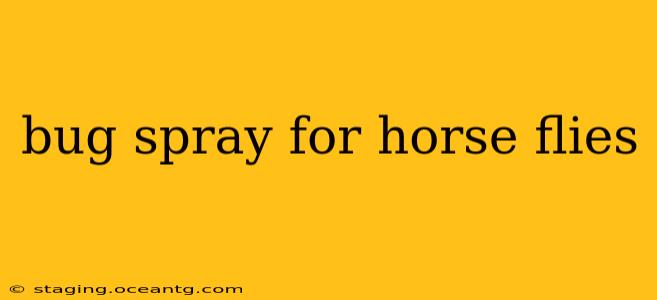Horse flies are more than just a nuisance; their painful bites can cause significant discomfort to both humans and animals. These aggressive insects can severely impact livestock productivity and even make outdoor enjoyment unbearable. This comprehensive guide explores effective bug sprays specifically designed for horse flies, along with other preventative measures to keep these pests at bay.
What's the Best Bug Spray for Horse Flies?
The "best" bug spray depends on several factors, including the application (human or animal), the environment, and the intensity of the infestation. Many commercially available repellents claim effectiveness against horse flies, but not all are created equal. Look for products containing the following active ingredients:
- DEET: A highly effective repellent for many biting insects, including horse flies. However, it's crucial to follow label instructions carefully, especially when using it on animals or children.
- Picaridin: A synthetic repellent similar in effectiveness to DEET but often considered milder on the skin. It's a good alternative for those sensitive to DEET.
- IR3535: Another effective repellent option, generally considered safe for use on both humans and animals.
- Permethrin: While effective, permethrin is a synthetic pyrethroid insecticide and should only be used on clothing and surfaces, never directly on skin or animals.
What other methods are there to repel horse flies besides spray?
While sprays offer immediate protection, a multi-pronged approach is often most effective. Consider these additional strategies:
-
Physical Barriers: Clothing that covers exposed skin is your first line of defense. Light-colored clothing is less attractive to horse flies. Mesh hats and netting can also help keep them away from your face and neck. For horses and other livestock, consider fly masks, sheets, and blankets.
-
Environmental Control: Horse flies breed in moist, shaded areas. Reducing these breeding grounds around your home or property can significantly decrease their population. This might involve draining standing water, removing stagnant pools, and maintaining a well-maintained lawn.
-
Fans: Horse flies are strong fliers, but they struggle against strong winds. Fans can help create a barrier and deter them from landing.
-
Traps: Various horse fly traps are available commercially. These traps usually attract flies with visual or olfactory lures and then trap or kill them. The effectiveness of these traps can vary.
Are there natural repellents for horse flies?
Several natural repellents have shown some promise in deterring horse flies, though their effectiveness may be less consistent than synthetic options:
-
Essential Oils: Certain essential oils, like citronella, lemongrass, and eucalyptus, have insect-repelling properties. However, their effectiveness against horse flies is often limited, and they require frequent reapplication. Always dilute essential oils before applying them to skin.
-
Plants: Planting certain plants, such as lavender, basil, and peppermint, around your property might deter some insects, but their effect on horse flies is generally not significant enough to be considered a primary control method.
How often should I reapply horse fly spray?
The frequency of reapplication depends on the specific product and environmental conditions. Always check the product label for instructions. Generally, you'll need to reapply every few hours, especially after sweating or swimming.
What are some home remedies for horse fly bites?
While preventing bites is the best approach, if bitten, home remedies can alleviate discomfort:
- Wash the area: Gently wash the bite area with soap and water to remove any irritants.
- Cold compress: Apply a cold compress to reduce swelling and itching.
- Hydrocortisone cream: A mild hydrocortisone cream can help reduce inflammation and itching.
Are horse flies attracted to certain colors?
While research is ongoing, some evidence suggests that horse flies are more attracted to darker colors. This is why wearing light-colored clothing is often recommended.
What are some effective ways to get rid of horse flies on my property?
Controlling horse flies on your property requires a combination of methods. Focus on eliminating breeding grounds, using appropriate repellents, and implementing physical barriers. Consulting with a pest control professional for a tailored solution may be necessary for severe infestations.
This guide provides a solid foundation for effectively managing horse flies. Remember that consistent effort and a multi-faceted approach are crucial for long-term success. Remember to always read and follow the instructions on any bug spray product you use.
